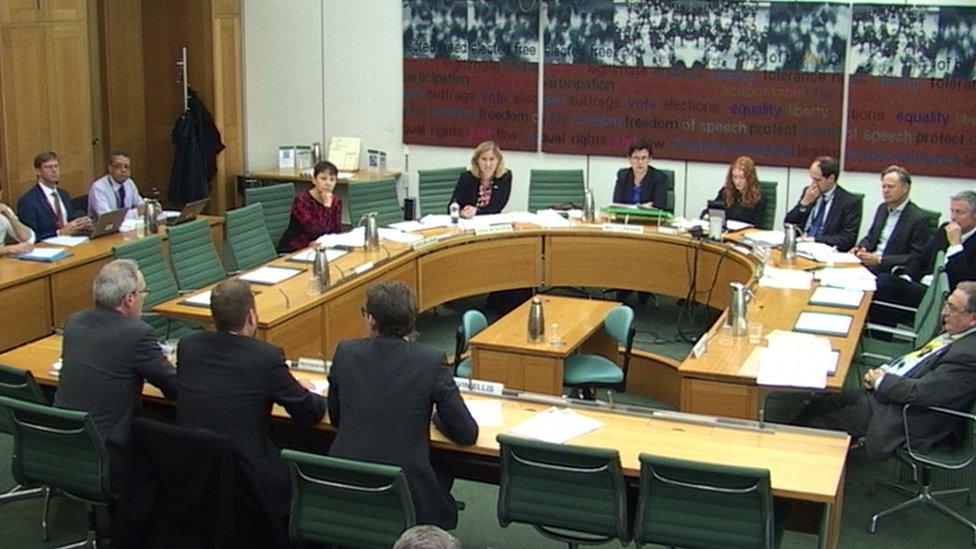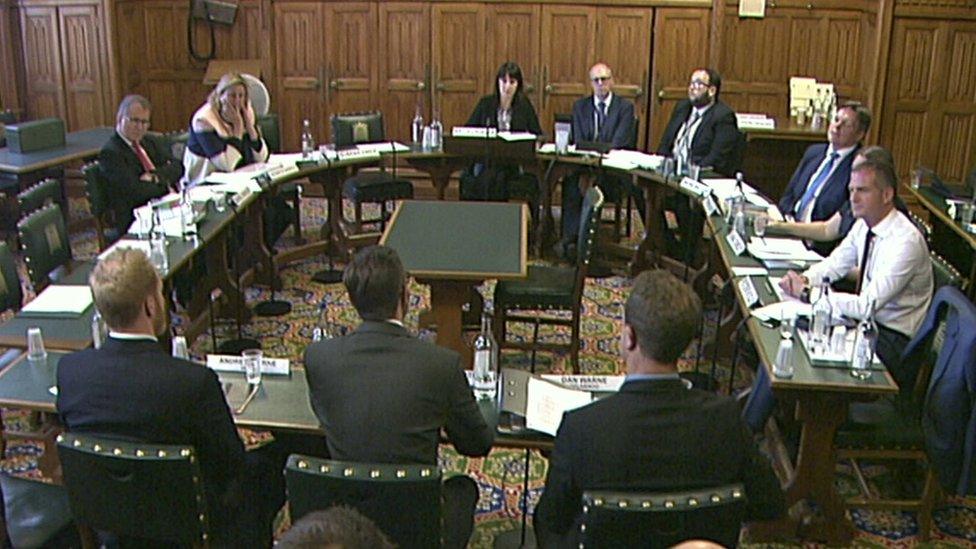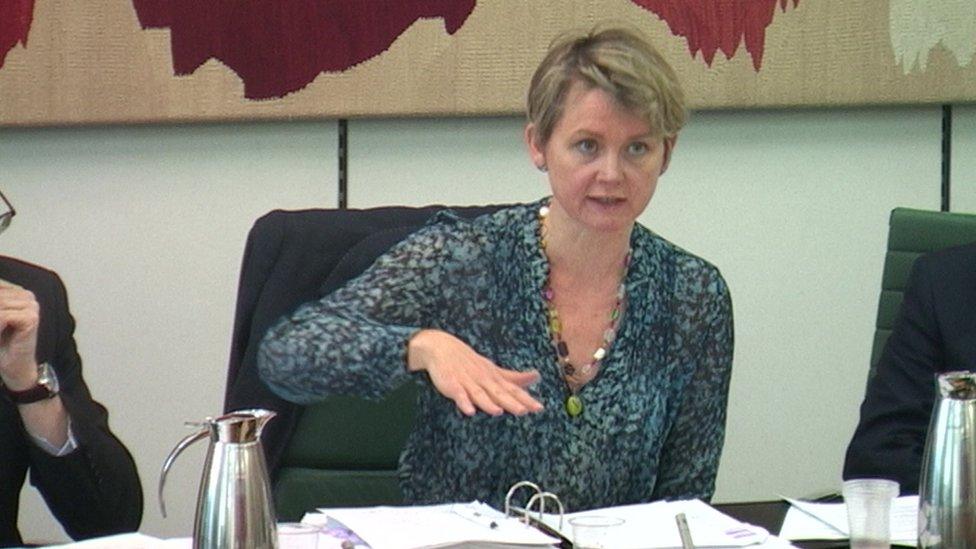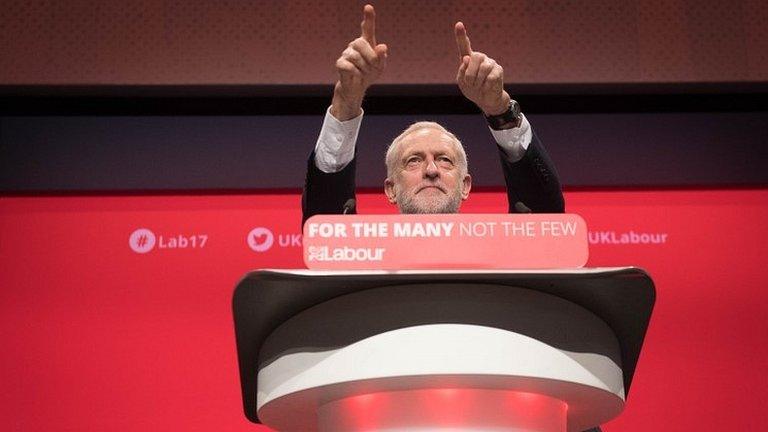What are the big issues for Parliament's committees?
- Published
- comments

At long last, the Commons select committee system is twitching back to life, after its post-election dormancy.
With a number of new chairs and plenty of new members - and no shortage of big issues to talk about - expect plenty of interesting hearings, which will probably start resulting in major reports by Christmas, or maybe the new year. With a minority government nursing a fractious parliamentary party, and heavily focused on Brexit, there are plenty of opportunities for ambitious select committee chairs to shape the agenda, and even drive policy, if they can deploy the skills and the streetsmarts to use their influence effectively.
A few loose ends remain. There is still no sign of the Parliamentary Intelligence and Security Committee, which is appointed by the PM, rather than elected by MPs.
With a series of major terror attacks earlier this year, and rising concern about the manipulation of social media by foreign powers, to influence the political process in Britain and elsewhere, members of the previous incarnation of the committee are keen to get to work.
Neither has the Commons Liaison Committee, external re-surfaced. This is the super-committee of all the main select committee chairs. It is best known for its hearings with the prime minister - the last of which was in December 2016. A hearing due to be held in March was cancelled because the election had been called.
Theresa May answered questions on Brexit when she appeared before the Liaison Committee
As its name suggests, the committee also has a behind the scenes coordinating role, allocating funding and staff.
And there is growing pressure for it to extend that brief, because so many committees are inquiring into Brexit issues that they are beginning to tread on each other's toes, sometimes interviewing the same witnesses on the same issues in the same week.
Normally the committees are pretty jealous of their independence, so any attempt to herd them could see particular chairs pushing back.
One other nerd point, the term limits which could see some long-serving committee chairs - like David TC Davies (Welsh Affairs) and Clive Betts (Communities and Local Government) - turfed out of office next year look set to be relaxed. So they can breathe again.
Here's a run-down of what some of the key committees look like...
Public Accounts, external is, as always, the most powerful and best-supported of the committees, drawing on the work of the National Audit Office. Their remit is to examine how taxpayers' money is spent, and they're looking at the cost of clinical negligence claims against NHS trusts, and at online fraud, among other subjects.
The Labour former minister, Meg Hillier, was re-elected as chair, but as I noted earlier, her longstanding deputy chair, the Conservative Richard Bacon has left the PAC, and it's not entirely clear who will emerge as the top Tory.
Geoffrey Clifton-Brown is the senior member, but the committee contains a number of upwardly mobile new-wave backbenchers, including Bim Afolami and Gillian Keegan.
The Brexit Committee, formally the Exiting the EU Committee, external, remains at the fulcrum of the biggest single issue before this Parliament. Its chair remains the formidable Hilary Benn, and the membership looks pretty formidable too.
In the Conservative contingent you can find former Cabinet ministers John Whittingdale and Stephen Crabb, arch Brexiteers Chris Chope, Jacob Rees-Mogg and Peter Bone, plus former justice minister Jonathan Djanogly. It is rather more Brexit-ish contingent than before the election.
On the Labour side lurk some strong remainers - Emma Reynolds, Stephen Kinnock and Pat McFadden, but to have any impact they will need to work closely with MPs from the smaller parties.
The overall arithmetic is nine Conservatives, probably lining up with the DUP's Sammy Wilson, versus five ordinary Labour members, (the Chair Hilary Benn would only vote to break a tie) two SNP MPs, plus one Lib Dem and one from Plaid Cymru.
In other words, the Conservatives look to have a one-vote majority, if everyone turns up and the DUP remain onside. Their first inquiry in will scrutinise the progress of the Brexit negotiations.
Sub-committee's agenda
The Foreign Affairs Committee, external saw the only instance of a sitting chair failing to win re-election, as Crispin Blunt was replaced by Tom Tugendhat - a newcomer from the 2015 intake who is already being talked of as a future party leader. The ranking Labour MP is probably Mike Gapes - a former chair of the committee himself, who has served on it since 2005.
At the Treasury Committee, external - always one of the most important committees - the chair vacated by Andrew Tyrie has been taken by the former education secretary, Nicky Morgan, with committee veteran John Mann chairing a sub-committee.
The committee is planning evidence sessions with all the obvious people - the Chancellor Philip Hammond, Andrew Bailey, chief executive of the Financial Conduct Authority and the Governor of the Bank of England Dr Mark Carney.
It will be looking at transitional arrangements after the UK leaves the EU and taking evidence on the preparedness of banks and insurers for Brexit. Other inquiry topics include threats to the tax base and the treatment of customers in RBS Global Restructuring Group.
But keep an eye on that sub-committee; Mr Mann is planning a series of inquiries into various agencies and organisations attached to the Treasury, starting with HMRC.
In the 2015 Parliament, noses on the Treasury Committee were left somewhat out of joint when the Public Accounts Committee held some spectacular hearings on tax collection, and tax avoidance by big multinational companies - this inquiry is a riposte to their PAC competitors.
Then there's the Crown Estate: a vast portfolio of lands and holdings which comprise the "Sovereign's public estate", which is neither government property nor part of the monarch's private estate…. Mr Mann wants to take an extensive look at that as well.

Rachel Reeves is in the chair of the Business Committee
Business, Energy and Industrial Strategy Committee, external - Labour's Rachel Reeves chairs the second most important economic select committee - and she plans to focus on the implications of Brexit for British business. They will go through different sectors of the economy, like the civil nuclear, automotive, and aerospace sectors, to establish how their interests can be served during the negotiating process and post-Brexit.
Defence, external - Dr Julian Lewis saw off a challenge from the former army officer Johnny Mercer for the chair of one of the most important and prestigious committees.
John Spellar, the former minister, whip and union leader is probably the most senior Labour member, but Mr Mercer remains one to watch.
In the last parliament he chaired a sub-committee looking at the treatment of service personnel who came under scrutiny in historic war crimes investigations; he disconcerted the Defence Secretary Michael Fallon (no mean feat in itself) with some very robust questioning, when he appeared before their sub-committee.
Interestingly he is now "double hatted" as a member of the Health Committee. I wonder if this could mean a joint inquiry into health issues affecting military personnel and veterans?
The committee has moved rapidly to start inquiries into the procurement of the American-made F-35 fighter aircraft, and on North Korea. It will also be holding an early hearing with the Defence Secretary, Michael Fallon.
Labour members
Education, external - the former minister Robert Halfon was one of the more surprising casualties of Theresa May's post-election reshuffle, where he lost his job promoting apprenticeships and industrial training.
But he rapidly bounced back to take the chair of the Education Committee, and his ministerial role, which reflected a long term policy interest, gives a big clue to his likely agenda in this politically sensitive role. The biggest Labour player looks to be Lucy Powell, who was briefly shadow secretary of state for education in Jeremy Corbyn's shadow cabinet, before joining the mass front bench resignation of June 2016.
So far the committee has announced two inquiries. First, into whether students and taxpayers receive value for money for their considerable financial investment in higher education. Do taxpayers see increased productivity from successful graduates? Do students enjoy an income dividend from their degree?
Second, they are to look at alternative provision, such as Pupil Referral Units, for young people who do not attend mainstream school because they have been excluded, or have behaviour issues, or a variety of other reasons. This group includes some of the most disadvantaged young people in society - and they are far less likely to achieve good exam results, find well-paid jobs or go on to further study.
The former frontbencher Mary Creagh took over the Environmental Audit Committee, external in the last Parliament, with a view to making it a green equivalent to the powerful Public Accounts Committee and maybe it is that ambition which has attracted some interesting figures to the EAC.
There's the maverick figure of Zac Goldsmith (who has a long-standing background in green issues as editor of The Ecologist magazine, a from 1998 until 2007) not to mention the former health minister Dan Poulter.
On the Labour side there's Co-Op Party luminary Geraint Jones and former front-bencher Kerry McCarthy. And then there's the Green Party co-leader Caroline Lucas. If this diverse band can be marshalled behind punchy reports, then the EAC could develop considerable clout.
Dr Sarah Wollaston remains in office at the Health Committee,, external buoyed by a reputation for independent-mindedness forged during the stormy passage of the coalition's NHS reforms, when she was critical of the legislation.
Labour have a high-powered contingent, with former Culture Secretary Ben Bradshaw and former front-bencher Luciana Berger (whose shadow ministerial brief was mental health) the two most senior figures. The committee boasts three medical practitioners, Dr Wollaston herself, the SNP's Dr Lisa Cameron, a clinical psychologist and the new Labour MP, Dr Paul Williams.

Immigration is one of the topics which will be examined at the Home Affairs Committee under Yvette Cooper
So to the Home Affairs Committee, external, where Yvette Cooper retained the chair unopposed - but has a couple of Conservative heavy-hitters to keep her in check; the former minister Tim Loughton chaired the committee after Keith Vaz was forced to resign, and is probably the ranking Tory, but there's also Chris Chope, who has already made his mark by registering his dissent to some statements from the chair, sending a clear signal that she will not have a clear run in evidence sessions. The committee is already pursuing one of the most sensitive Brexit issues, the implications for and conduct of immigration policy.
Justice Committee, external: here the Conservative former justice minister, Bob Neill, retained the chair, despite, or maybe because of being one of the few Tories to rebel over the Article 50 Bill. His senior Labour member is probably another former minister, David Hanson, but keep an eye on Ellie Reeves, from the 2017 intake, who is an employment law barrister.
An early priority will be an inquiry into the state of the UK's prison system - and the committee will also carry out a pre-legislative scrutiny inquiry into draft legislation on the personal injury discount rate.
The Northern Ireland Affairs Committee, external is under new management, with the former Northern Ireland minister and Navy doctor, Andrew Murrison, in the chair.
Normally this committee is not exactly at the forefront of parliamentary politics, but given that the future of the land border between Northern Ireland and the Republic is one of the trickiest conundrums posed by Brexit it could well have a role to play.
The committee has re-launched its inquiry on the Border question, and will examine the implications for the Common Travel Area and the Good Friday Agreement of whatever proposal emerge from the Brexit talks - as well as looking at how the views of Northern Ireland will be represented in those negotiations, particularly while the Assembly is suspended.
PACAC - the Public Administration and Constitutional Affairs Committee, external - pressed hard, but unsuccessfully, for a Parliamentary Commission to be set up, to look at the future of the civil service. Under its long-serving chair, Bernard Jenkin, it will now examine whether the Civil Service has the effectiveness and capacity to cope with Brexit.
- Published27 September 2017
